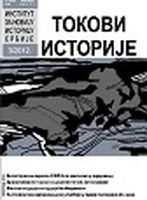Непознанице о посети Димитрија Димитријевића Турској марта 1929. године
Unkown Facts About the Visit of Dimitrije Dimitrijević to Turkey in March 1929
Author(s): Srđan MićićSubject(s): History
Published by: Institut za noviju istoriju Srbije
Keywords: foreign policy; diplomacy; Kingdom of Serbs; Croats and Slovenes/Yugoslavia; Turkey
Summary/Abstract: It is not possible to establish all relevant facts concerning the mission of Dimitrije Dimitrijevic on the basis of available archive documents. Further research in Turkish archives would probably provide a better insight into topics that were discussed in March 1929 and explain reasons why the highest statesmen did not receive him in audience. Nonetheless, it is possible to draw a conclusion based on above presented facts on Yugoslav-Turkish diplomatic activities. Since the ratification of the Peace Treaty in 1925, although bilateral relations were correct certain diplomatic activity was assessed differently which corresponded to each country’s foreign policy. The Turkish government was expecting a return a visit of the Yugoslav foreign affairs minister, even a courtesy visit, and the Yugoslav postponement of Legation relocation from Istanbul to Ankara was appraised as a qualification of their state being rated as secondary factor in Yugoslav foreign policy. On the other hand, the Yugoslav government subordinated relations with other Balkan countries on account of British support in defining more precise relations with Italy and Yugoslav position toward U.S.S.R. Hence, the Yugoslav government could not understand the Turkish delay in appointing a new plenipotentiary minister in Belgrade from the point of view of Turkish sensitiveness. These differences created circumstances for different assessments in selecting recourses and channels of communications between Yugoslavia and Turkey. An aggravating circumstance in the particular case of Dimitrije Dimitrijevic’s visit to Turkey was the absence of key figures from the Yugoslav Ministry of Foreign Affairs as well as previous disagreements between Dimitrije Dimitrijević and Jevrem Tadić. Specific instance was perhaps the unconscious downgrading of Tevfik Rüştü bey’s authority, on a state and international level, by not returning the official visit of the Turkish Minister of Foreign Affairs or not selecting an official form of communication through diplomatic representatives - the Yugoslav government opted for informal diplomacy. All aspects of this issue led to a very complicated situation in March 1929 which could not easily be explained neither by Turkish and Yugoslav ministries of Foreign Affairs nor by the Yugoslav Legation in Istanbul. Nonetheless, the Turkish government patiently waited for an opportunity to give a precise answer in November 1930 with respect to the state level, foreign policy and diplomatic dimension of the message. Tevfik Rüştü bey gave a complete answer of the Turkish government by providing general information to plenipotentiary minister Ljubomir Nešić and to the head of delegation Lazar Marković with an unusual choice of an emissary personated in Dimitrije Dimitrijević. This case study gives a good insight into the fundamental differences between inter-state relations and communications. Although foreign policy defines basic framework, concepts and specific objectives, dip
Journal: Tokovi istorije
- Issue Year: 2014
- Issue No: 1
- Page Range: 201-215
- Page Count: 15
- Language: Serbian

